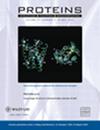Beyond Single Chains: Benchmarking Macromolecular Complex Prediction Methods With the Continuous Automated Model EvaluatiOn (CAMEO).
IF 2.8
4区 生物学
Q2 BIOCHEMISTRY & MOLECULAR BIOLOGY
引用次数: 0
Abstract
Independent, blind assessment of structure prediction methods is essential for establishing state-of-the-art performance, identifying limitations, and guiding future developments. The Continuous Automated Model EvaluatiOn (CAMEO) platform provides weekly, automated benchmarking of structure prediction servers, complementing the biennial Critical Assessment of Structure Prediction (CASP) experiments.
超越单链:用连续自动模型评估(CAMEO)对标大分子复合物预测方法。
独立的、盲目的结构预测方法评估对于建立最先进的性能、识别局限性和指导未来发展至关重要。连续自动化模型评估(CAMEO)平台每周提供结构预测服务器的自动基准测试,补充了两年一次的结构预测关键评估(CASP)实验。
本文章由计算机程序翻译,如有差异,请以英文原文为准。
求助全文
约1分钟内获得全文
求助全文
来源期刊

Proteins-Structure Function and Bioinformatics
生物-生化与分子生物学
CiteScore
5.90
自引率
3.40%
发文量
172
审稿时长
3 months
期刊介绍:
PROTEINS : Structure, Function, and Bioinformatics publishes original reports of significant experimental and analytic research in all areas of protein research: structure, function, computation, genetics, and design. The journal encourages reports that present new experimental or computational approaches for interpreting and understanding data from biophysical chemistry, structural studies of proteins and macromolecular assemblies, alterations of protein structure and function engineered through techniques of molecular biology and genetics, functional analyses under physiologic conditions, as well as the interactions of proteins with receptors, nucleic acids, or other specific ligands or substrates. Research in protein and peptide biochemistry directed toward synthesizing or characterizing molecules that simulate aspects of the activity of proteins, or that act as inhibitors of protein function, is also within the scope of PROTEINS. In addition to full-length reports, short communications (usually not more than 4 printed pages) and prediction reports are welcome. Reviews are typically by invitation; authors are encouraged to submit proposed topics for consideration.
 求助内容:
求助内容: 应助结果提醒方式:
应助结果提醒方式:


